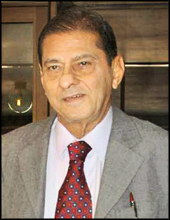Fine tune the executive presidency for post-war growth
 The executive presidency that proved to be an incomparable asset for
fighting terror could be an equally potent vehicle for rapid development
during peace times. The executive presidency that proved to be an incomparable asset for
fighting terror could be an equally potent vehicle for rapid development
during peace times.
Former Constitutional Affairs Minister K.N. Choksy P.C. put it
succinctly: “the institution should not be abolished in a hurry. The
powers attached to the Office could be reconsidered and modified where
necessary.” Fine-tuning the executive presidency must consider
Parliament’s oversight responsibilities or the failure thereof, which
had been ignored by those calling for the abolition of the executive
presidency rather off-handedly.
Oversight has been designed in France and the US through processes
that had worked well.
Funding authority for oversight
It is vital that Parliament is made to carve out processes for
ensuring that allocations are well planned, executed and in fact checked
for compliance with Parliamentary directives. That must be considered in
any proposal to amend the constitution.
Some of the existing committees could be elevated and given more
muscle to carry out that task.
 |
|
K.N. Choksy
P.C. |
Efforts to democratise the executive through a more broad-based
governance mechanism could begin by introducing a broader parliamentary
committee system and an open vote on all legislative enactments
containing appropriations.
Ability to vote money is the supreme power Parliament has. That
needed to be carried out in a manner that eliminates the so called
‘majoritism’ associated with the party system which is the current basis
for electing Members of Parliament.
It should not weaken the executive either if sufficient dialogue were
forthcoming between the legislature and the executive during the
committee stage.
In both parliamentary and executive presidency, the root cause of
one-sided governance is the fact that once a majority is found after the
elections, party whips will not allow a free vote to its members-because
that would be fatalistic for the party in power to lose a vote on a
crucial Bill. If at the Committee deliberations a conscientious dissent
is allowed when a Bill is first considered, then that decision could be
transmitted to the full House at which time strict party vote could be
demanded.
During the deliberations of the Committee there would be greater give
and take as the government is not risking its very existence on the
outcome of the committee vote.
That way all Bills would be considered on merit and members could
compromise on grounds of feasibility of the legislative proposal, its
applicability, etc. Amendments could be voted in to delete or add on new
provisions. Even the details of the money allotted could be spelled out
elaborately as to prevent abuses once its leaves the control of the
House.
If fact when J.R. Jayewardene proposed the executive presidency, he
had reportedly predicted that the system would work better with a
President from one party and the Prime Minister from another. That did
not materialise during the Kumaratunga Presidency with Ranil
Wickremesinghe as Prime Minister.
The missing link happened to be the free vote and a committee
apparatus - in other words a prerequisite for compromise did not exist
the way the 1978 Constitution was drafted.
No give and take
The crux of the matter is that compromises need to be worked through
a non-competing legislative atmosphere. Once a committee is ready to
recommend changes to a Bill it could be sent back to the President’s
legislative counsel for review and that way a better product comes out
of the whole legislative effort.
In the US, the House and the Senate there is a procedure for the same
Bill to be approved with some major changes. A joint session of the
Senate and the House then go over it to bring out a workable compromise.
That is happening now as the Obama Healthcare Bill that was approved
last week by the House. It would then go to the Senate which may add or
delete parts of it. A joint session of the Congress then fine tunes it.
Second Chamber
May be a Second Chamber might be looked into as a legislative
oversight stop-over prior to formal votes being cast in Parliament.
That could also attract a group of knowledgeable legislators from
among those disinclined to face the vagaries of electoral campaigning.
Senate could be the final check point for better counsel. Its
composition has to be crafted with those lofty goals in mind-if we ever
want to take that rout.
Executive presidency can be made to work with number of these
processes, if adequate thought is given to making the governance a
critical issue and not whether we should abolish the executive
presidency and go back to the old system based on some whim. It was that
system which caused the one party rule so dictatorially unacceptable in
the first place.
It was frequently chanted then that governance under a Prime Minister
was nothing but a one party dictatorship for five years.
We have an executive presidency which is not based on the strict
theory of the separation of powers but something in between when we
abolished the British system which had combined Legislative and
executive functions. The hotchpotch may need some revising.
Only remedy for misuse of executive power is impeachment which is
near impossible to achieve. The US system has provided for greater
degree of give and take between the executive and the legislature
through what is known as the Congressional committees and public
hearings.
Some of the key elements of what would ensue as the country grapples
with the form of governance were taken up here. This is no frivolous
matter to be left to the fanciful inclination of political campaigns but
for careful consideration in view of the proven suitability of the
executive presidency in the context of the security threats. |



